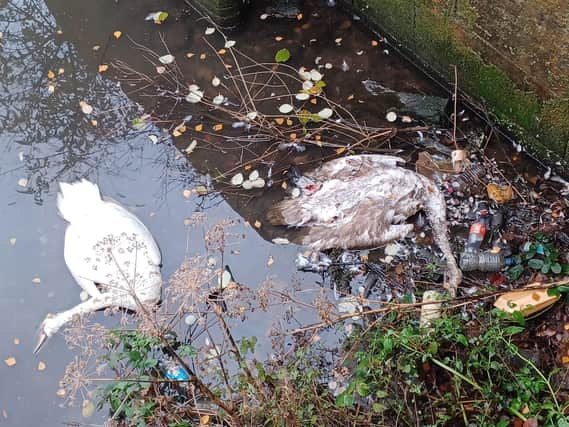Bird flu continues to spread in South Yorkshire with confirmed cases at Treeton Dyke


DEAD birds continue to be found at nature reserves in South Yorkshire after a strand of bird flu was detected.
Treeton Parish Council told residents that avian flu had been spotted at Treeton Dyke after dead swans and geese were found there last Friday.
Advertisement
Hide AdAdvertisement
Hide AdThis comes after the RSPB announced avian flu had been investigated at two of its Dearne Valley reserves in Wombwell and Adwick Washlands earlier this month.
Two dead swans and a duck were also reported in the South Yorkshire Navigation Canal, adjacent to Rotherham Central station, on December 8 but there are still no signs of the birds being moved at all over two weeks later.
Residents questioned how the wild birds had come came to be there with reports of “suspicious behaviour” that they were so close together at the water’s edge and wondered if they had been “dumped” them there.
Rotherham Council are now advising walkers to take care when walking near open bodies of water and to pay attention to information signs at sites such as Treeton Dyke and at the country parks.
Advertisement
Hide AdAdvertisement
Hide AdA Treeton Parish Council spokesperson said residents were advised not to touch or move dead wild birds to stop the increase of infection.
Bird keepers are also asked to remain vigilant and to report any concerns of avian flu to the Animal and Plant Health Agency, even if the signs are mild, RMBC added.
The council said avian influenza is a potentially fatal virus for wild, poultry, game and captive birds, with symptoms including:
• swollen head
• closed and runny eyes
• lethargy and depression
• breathing difficulties such as gaping (mouth breathing), nasal snicking (coughing sound), sneezing, gurgling or rattling
• fever or noticeable increase in body temperature
• discoloured or loose watery droppings
• stop or significant drop in egg production
Advertisement
Hide AdAdvertisement
Hide AdAnother symptom would be if a bird dies suddenly without any evidence of ill health or natural causes with some species such as ducks, geese and swans, who can carry the avian influenza virus and spread it without showing any signs of illness.
You can contact Rotherham Council by emailing [email protected] or by calling the Department for Environment, Food and Rural Affairs helpline on 0345 933 5577 if you find a dead bird in a park or public space.
If you suspect bird flu in poultry or other captive birds, you must report it immediately by calling the Animal and Plant Health Agency on 03000 200 301.